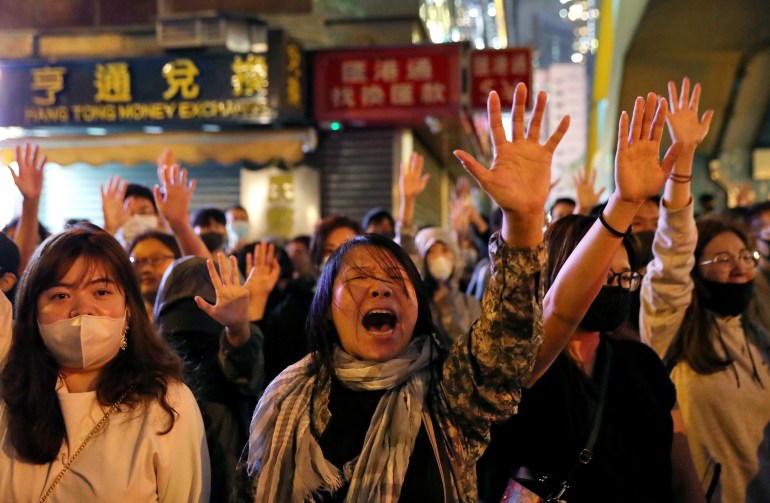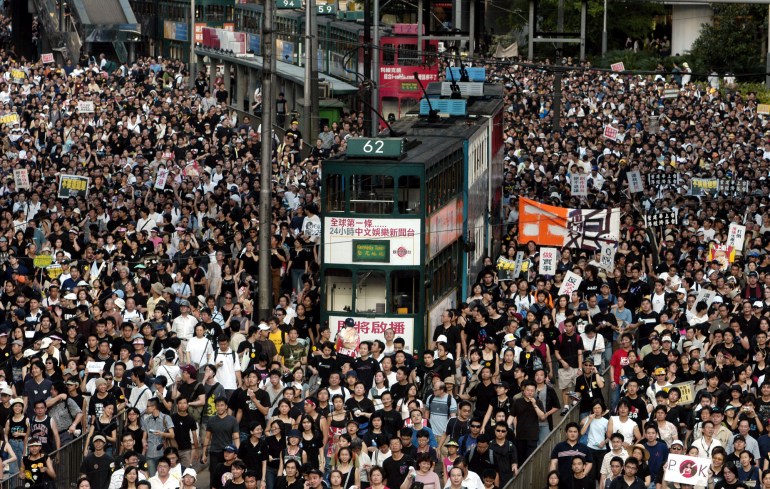Human rights groups and foreign governments fear the fast-tracked law will erode civil liberties and could be used to silence critics.
Hong Kong's legislature unanimously passed a new national security law expanding the government's power to crush dissent.
The National Security Protection Act passed on Tuesday includes new measures on treason, espionage, foreign interference, state secrets and sedition.
“Today is a historic moment for Hong Kong,” Chief Executive John Lee said, adding that the law, which punishes five major crimes, will come into force on March 23.
The law gives the government more power to suppress dissent, which is widely seen as the latest step in a widespread political crackdown sparked by pro-democracy protests in 2019.

This comes on top of similar legislation – the National Security Law – imposed by China in 2020, which has already largely silenced opposition voices in the financial hub. But the Chinese and Hong Kong governments say the law imposed by Beijing has restored stability after the 2019 protests.
Critics say the key legislation, known as Article 23, passed Tuesday, threatens freedoms in the Chinese-ruled city.
“It makes the national security system more comprehensive,” John Burns, professor emeritus at the University of Hong Kong, told Al Jazeera. “It includes a whole range of things that were not crimes before or were colonial crimes, but they modernized the crimes, toughened the punishment.”
“Full speed” legislation.
The bill was first introduced to the 90-seat, pro-China assembly on March 8, after a month-long public consultation, with Hong Kong's leader calling for its passage “at full speed.”
Eighty-eight politicians and the Speaker of the Council voted unanimously to enact the legislation.
The law threatens to impose severe penalties for a wide range of acts that authorities describe as threats to national security, the most severe of which – including treason and rebellion – are punishable by life imprisonment.
Less serious crimes, including possession of seditious publications, can result in several years in prison. Some provisions allow criminal prosecutions for acts committed anywhere in the world.
Those found guilty of treason could face sentences of up to life imprisonment, while those convicted of violating state secrets or espionage could face prison sentences of 10 and 20 years, respectively. Penalties for alleged collusion with foreign forces will also be increased, especially if people are working together rather than alone.
Punishments for sedition, currently dealt with under a colonial-era law, were increased to between seven and ten years from two. In contrast to the internationally accepted standard for sedition, the new law stipulates that people can be charged with committing the crime even without an element of violent intent.
Other provisions include allowing police to detain suspects for two weeks before charging them, compared to the current 48 hours, and giving police the ability to apply for permission to withdraw a defendant's right to counsel while in pre-charge detention. The draft law also allows authorities to cancel the passports of “fugitives.”
Legislative Council Speaker Andrew Leong said he believed all lawmakers were honored to participate in this “historic mission.”
In 2003, an attempt to pass a version of the law led to a street protest that attracted half a million people, leading to the legislation being withdrawn.

Former lawmaker Emily Lau told Al Jazeera that the situation has changed a lot since then. “If you ask people here, they will tell you – or rather they don't dare tell you. There are no demonstrations, no public gathering, it's very quiet, eerily quiet,” she said.
At the council building, politicians said the new legislation was a necessary step to protect Hong Kong's status as an international hub, likening it to a front gate guarding the city's residents from danger.
'A devastating blow to human rights'
Some human rights organizations and foreign governments have criticized the ambiguity of Article 23 and said it may be used to silence critics.
Critics also worry that the new law will further erode civil liberties that China promised to preserve for 50 years when the former British colony returned to Chinese rule in 1997.
“With this tough legislation, the Hong Kong government has dealt another crushing blow to human rights in the city,” said Sarah Brooks, Amnesty International's China director.
“This is a devastating moment for the people of Hong Kong, hundreds of thousands of whom have already marched in the streets to demonstrate against repressive laws, including the incarnation of this law in 2003. Today they have lost another part of their freedom – any act of peaceful protest is now even more dangerous.” since when.




/cdn.vox-cdn.com/uploads/chorus_asset/file/25550621/voultar_snes2.jpg)

More Stories
Two children killed, 11 injured in stabbing attack at Taylor Swift dance party in UK, 17-year-old arrested
Fiber optic communications networks are being sabotaged – DW – 07/29/2024
Putin warns US against deploying long-range missiles in Germany | NATO